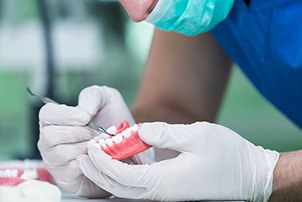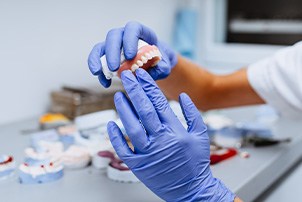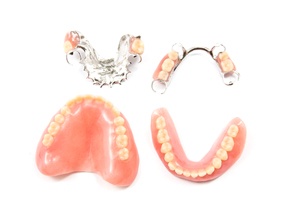Partials and Full Dentures – Centerville, OH
Custom-Made Restorations for Missing Teeth
You need your teeth to speak clearly and eat whatever you like; if they’re missing, these everyday tasks may suddenly seem impossible. Whether it’s to replace a few teeth or an entire arch, dentures can significantly increase your quality of life and give you the confidence to smile again. Dr. Dan can provide you with a custom-made, natural-looking restoration. If you or a loved one is facing a life without teeth, contact our practice today.
Who’s a Good Candidate for Dentures?

Dr. Dan usually recommends dentures for patients who have suffered from significant tooth loss; if only one or two teeth are missing, a single dental implant or a dental bridge might be more appropriate. When getting dentures, you’ll need to have enough healthy gum tissue and jawbone remaining to support the false teeth. We’ll take all the necessary factors into account to help you decide the best way to repair your smile!
Effects of Missing Teeth

Tooth enamel is the strongest part of the entire body. They are even stronger than bone tissue. However, teeth can still become damaged if you aren’t careful. Teeth can be lost due to tooth decay, gum disease, and trauma to the mouth. According to the American Academy of Periodontology, there are numerous negative side effects of tooth loss, like facial sagging, difficulty speaking, challenges while eating, and low self-esteem. When you replace your missing teeth with dentures, you can improve all of these areas resulting in a better overall quality of life.
What Qualifies You for Dentures

Dentures are an excellent solution for those who are missing multiple, most of, or all of their teeth. Depending on the number of teeth you are missing and where they are located in the mouth, our team can put together a customized plan to meet your needs. However, it is important that you have good oral health before getting dentures. Any existing dental issues, like tooth decay and gum disease, need to be addressed and eliminated ahead of time. Once your existing teeth and gums are in good health, we can move forward with the rest of the denture process.
Alternative Tooth-Replacement Options

If dentures don’t sound like the right option for you, there are other solutions out there to address tooth loss. Here are the other popular services that we offer:
- Dental Bridge: A dental bridge works by “bridging” the gap in your smile with a replacement tooth. The replacement tooth, also called the “pontic,” is supported by two dental crowns that are placed on the adjacent teeth.
- Dental Implants: A dental implant is a titanium, screw-like post that is surgically inserted into the jawbone to support a replacement tooth. This requires that the patient has a healthy, sufficient jawbone. Dental implants have a higher upfront cost, but they are made to last for many decades before needing to be replaced. You may never have to worry about your missing teeth again!
What are Dentures?

Dentures are removeable false teeth used in cases of extensive tooth loss. There are two basic kinds:
- Full Dentures: Likely what you’ll think of at first, full dentures are used when all of the teeth in your upper or lower jaw are missing. (Any remaining teeth are extracted first.) They usually consist of an acrylic base and porcelain teeth. They’re usually held in place via natural suction, but a special adhesive can also be used.
- Partial Dentures: Sometimes there will be a few gaps in your smile, but you’ll still have plenty of healthy teeth worth saving. Partials are designed to fill in the empty spaces. In most cases, a metal clasp will secure them in the mouth.
Dr. Dan can perform a thorough examination of your mouth to decide what type of restoration would work best for you.
How Dentures are Made

Before you commit to dentures, you’d be wise to learn how they’re made. Knowing what went into your restorations would help you see their value. Fortunately, we at Dr. Passidomo’s office will gladly share the ins and outs of denture creation with you. These details should give you a sense of how the replacement teeth came to be, whether they suit you, and more. Simply keep reading to learn the relevant points, or call our office soon.
What are Dentures Made Of?

Every denture has a base and artificial teeth, no matter its model. These two parts ensure treatment works properly, restoring your smile’s looks and function. Just take a look at their details below:
- Denture Base – A denture’s base is its foundation, the part that keeps the artificial teeth secure. Most dental labs will make it from pink-colored acrylic or effective substitutes like nylon.
- Artificial Teeth – Per their name, the artificial teeth are dentures’ tooth-replacing parts. Labs make them from resin or porcelain to match your smile’s color.
The Denture Creation Process

Since a denture is customized for a patient’s mouth, making one is a multi-step process. The crucial steps involved include:
- Step 1: Using a dental impression, Dr. Passidomo will design a plaster model of your mouth. This model will match your denture’s final size and shape.
- Step 2: Our team will send the model to a lab, which will use it to make a wax gumline.
- Step 3: Lab workers will set artificial teeth in the completed wax gumline. In doing so, they’ll have crafted a prototype denture.
- Step 4: After we get it back, our team will check the prototype against your mouth. We’ll then return it when we’ve confirmed its fit.
- Step 5: A worker will place the prototype in a flask after removing the wax. They’ll then apply plaster to the flask and have it sit in hot water.
- Step 6: To keep the prototype’s materials from sticking, a separator will go into its plaster layer. Acrylic will be injected into the flask to replace the wax.
- Step 7: The dental lab will remove all plaster to reveal the final denture. Then, they’ll place the restoration in a bath to remove its residue.
- Step 8: The lab’s workers will remove your denture’s excess acrylic and polish its surface.
- Step 9: To ensure it works smoothly and easily, our office will fit your final denture for you.
Adjusting to Your New Dentures

Your mouth will feel sore when you first get dentures, but don’t worry; this effect should fade quickly. Any initial aches or pains will disappear as you slowly adjust to your new teeth.
Of course, you can speed up the adjustment if you’d like. Eating soft foods for a while would help you avoid irritated gum tissues. Similarly, you could apply adhesives to keep your dentures secure and exercise your facial muscles. Such approaches would help your tooth replacements feel familiar.
If pain from your adjustment sticks around, please call us. We’ll look at your denture and see if it needs more alterations.
The Benefits of Dentures

There is a reason that year after year, decade after decade, dentures continue to be a popular tooth-replacement solution. In fact, there are several! In this next section, we’re going to cover a few of the many benefits of modern dentures to hopefully help you decide if they are right for you.
Improved Confidence

If you are missing several teeth or an entire arch of teeth, then you know all too well how much of an impact it can have on your self-esteem. There have been several studies that have found that it can have a negative effect on your social life and career as well. Fortunately, dentures can seamlessly fill the gaps in your smile or replace all of your teeth so that you have a beautiful smile you’re happy to show off, improving your confidence as well as your personal and professional life.
Clearer Enunciation

If a small gap between your teeth can negatively impact your speaking patterns, then you can imagine what multiple missing teeth can do. Unfortunately, this results in many patients with tooth loss becoming more reserved and avoiding social situations altogether. If that sounds all too familiar, then reach out to our Centerville dental team to schedule a consultation. From there, we can determine if dentures are a good fit and, if they are, start the process of filling the gaps in your smile.
Improves Nutrition

Another downside of tooth loss is that it can make it very difficult to chew. Since not being able to chew properly severely limits what you can eat, there’s the risk of malnutrition. That’s why we strongly recommend reaching out to us to explore your treatment options sooner rather than later! With dentures, you’ll be able to enjoy most foods again – including fresh fruits and vegetables – and keep your body happy and healthy.
Preserves Oral Health

We mentioned above that dentures allow you to eat a more varied diet, which helps keep your jawbone strong, your gums healthy, and your teeth in good condition. Turns out, that’s just one of the many ways dentures benefit your oral health! Since partials perfectly fill the open spaces in your smile, they help prevent dental drift, which is when the teeth surrounding the gap begin to drift, negatively impacting the alignment of your teeth and bite in the process.
Cost-Effective

Dental implants come with several benefits, including the fact that they are inserted directly into your jawbone. Of course, they also are more expensive, which is why many patients opt for dentures instead. Not only is this tooth-replacement solution more affordable upfront, but it is also often covered in part by dental insurance, which makes it more budget-friendly as well.
Implant-Retained Dentures

If the density of your jawbone allows it, dental implants can be used to support a denture. An implant is a metal post that’s surgically placed beneath your gumline and effectively serves as the “root” for your new teeth. Full dentures can often be supported by four to eight implants.
False teeth secured by dental implants won’t slip, and the chewing power they provide is almost equal to that of natural teeth. The implants will also help you maintain a more youthful appearance by preventing bone loss in your jaw and maintaining a healthy facial structure.
Understanding the Cost of Dentures

Dentures are highly customized based on your specific needs, so it’s hard to provide a specific price until you’ve completed a detailed exam at our office. Certain factors can have a larger impact on what you’ll pay, including the number of teeth missing, the materials, whether dental implants are combined with your denture and more.
Factors that Affect the Cost of Dentures

While there are several factors that can influence the cost of dentures, the most notable ones include:
- Preparatory treatments needed to make room for a denture (i.e. tooth extractions, gum disease therapy, etc.)
- Types of acrylic used to create the base of the denture (this is the portion that is gum-colored and customized to match your natural gum tissue)
- Materials used to create your replacement teeth (typically made from acrylic to lower costs, but can be made with dental ceramic for better esthetics and durability).
Remember that opting for cheaper materials is not typically the best route to take when choosing a denture. For something that’s going to be in your mouth most of the day, you’ll want it to be of a certain quality.
Are Implant Dentures More Expensive?

Implant dentures are going to be more expensive by default because of the additional steps needed to provide them. For example, dental implants need to be surgically placed into the mouth. This is what makes them more permanent and longer-lasting than traditional dentures. It also means they won’t slip or shift out of place while in use, even when chewing very tough, hard, or crunchy foods. Compared to dentures that need to be replaced every 5 to 7 years, implant dentures can last for decades. These benefits and more are what make them a better long-term investment despite the higher upfront cost they carry.
Does Dental Insurance Cover Dentures?

Dentures are generally considered a major procedure, which means they typically receive at least partial coverage from most dental insurance plans (i.e. up to 50%, depending on the plan and insurance provider). However, you’ll need to confirm your coverage with your insurance company directly before making any commitments to treatment. Our team is happy to facilitate this process as well so you can have a better idea of your costs beforehand.
Other Options for Making Dentures Affordable

There are other options to consider even if you don’t currently have a dental insurance plan to utilize. Third-party financing solutions can make it easier to pay for your replacement teeth. For example, American General and CareCredit allow you to make payments on dental care over an extended period of time (typically several months to over a year). With little to no interest attached to these monthly payments, making even the most expensive dental services affordable becomes possible even on a tight budget.
Dentures Aftercare

True enough, dentures are great at replacing teeth. Patients wouldn’t get them otherwise. However, they’ll only work properly with good care. Dentures need regular upkeep to maintain themselves. With anything less, they’ll fail early and cause oral issues. Luckily, we at Bright Smiles Dentistry can help: below are some helpful tips on caring for dentures. By reading them, you can make your new smile last a while! For other details, you could also call our office.
Removeable Dentures
Remove After Eating

First, you should rinse your dentures after meals. This habit will keep food bits and plaque from sticking to them. From there, you’ll have a lower risk of oral issues.
Still, avoid hot water for the rinses. Overheated liquids can warp denture material. That being the case, a steamy rinse will distort your denture’s fit.
Clean Your Restoration
Along with post-meal rinses, remember to give dentures once-daily cleanings. These sessions remove germs and debris that you might miss otherwise.
Thankfully, denture cleanings are simple. Once the prosthetics are out of your mouth, brush them with a toothbrush and hand soap. (Don’t use normal toothpaste; it’s abrasive and harms dentures.) Next, soak the dentures in a solution if there’s time. You can then rinse them before putting them back in your mouth.
Keep Your Dentures Safe
While dentures are sturdy, they aren’t invulnerable. They can easily break if put under enough pressure. So, keep your dentures safe when they’re not in use.
Of course, several methods exist for protecting dentures. One example is to place a towel in your sink during the daily cleanings. (That way, you’d cushion the restorations from falls.) Another is to store dentures securely in a case or container. After all, the latter item would protect the teeth from roughhousing pets or kids.
Remove Dentures When You Sleep
Though they’re lifelike, you shouldn’t wear dentures to sleep. Instead, remove them before you go to bed. You can even place them in a soaking solution overnight.
In reality, using dentures constantly harms your health. It restricts your gums’ circulation, resulting in tissue irritation. The habit also raises your tongue’s plaque levels, putting you at risk of tooth decay and gum disease. In fact, constant denture use can even cause pneumonia.
Notice Changes
Once you begin wearing dentures, monitor both them and your mouth. Either could develop problems that need a dentist’s help. In particular, watch out for mouth sores, gum irritation, and infections.
Crucially, you’ll need a dentist if your dentures don’t fit well or get damaged. Trying to fix them yourself will just make things worse. In contrast, a qualified dentist can refit or even replace the prosthetics.
Denture FAQs
Can I sleep with my dentures?
Your denture dentist in Centerville will instruct you to wear your new teeth for 24 hours; however, after the first day, you’ll need to remove them nightly. Although you might be concerned about getting caught without your teeth, your oral health and the lifespan of your denture relies on taking it out before bed. Circulation in your gums is restricted while you’re wearing them. If the soft tissues aren’t given time to rest, sores, inflammation, and infections can occur. Not to mention, harmful oral bacteria can collect on your denture, which can have adverse oral and general health consequences. Bacteria buildup can also damage your denture, shortening its life expectancy. Taking your denture out before calling it a night gives your gums the break they need to recuperate while allowing you to clean your mouth and denture well. Besides brushing, soak your denture in a nightly solution to kill any lingering bacteria.
Do I use regular toothpaste to clean my dentures?
Your denture will function as your natural teeth, but they aren’t cleaned the same way. Abrasive dental products can scratch the surface of your dentures. Not only can they affect their strength and aesthetics, but food particles and plaque can get trapped in the small spaces, leading to odor-causing bacteria. Your implant dentist recommends using a soft-bristled toothbrush and mild hand soap or dishwashing liquid. You can also purchase OTC cleaning products designed for denture wearers.
Can I eat steak with dentures?
It is entirely possible to have a steak with dentures, but only in moderation. Tough meats will put more wear and tear on your denture, causing you to need a replacement sooner. Chewy meats can also cause gum and jaw pain. If you can’t resist a juicy steak, it’s best to choose meat with little connective tissue or muscle fibers that’s tenderized before cooking it. Cut the meat into small pieces to make them easier to chew. You can add the support of a denture adhesive for extra stability when enjoying your favorite meat dishes.
Does an upper denture always cover the palate?
If you need to replace your upper teeth, you might be envisioning a prosthetic that covers the roof of your mouth. It’s normal to be concerned about a top denture changing the way your food tastes, but there’s no reason to worry. Dentures come in many styles, like palate-less options. Instead of a traditional upper denture, you can choose one with a horseshoe appearance, like those used for the lower arch or along with dental implants. Your dentist will explain all your options to find the ideal denture for your needs and preferences for the perfect investment you desire.










